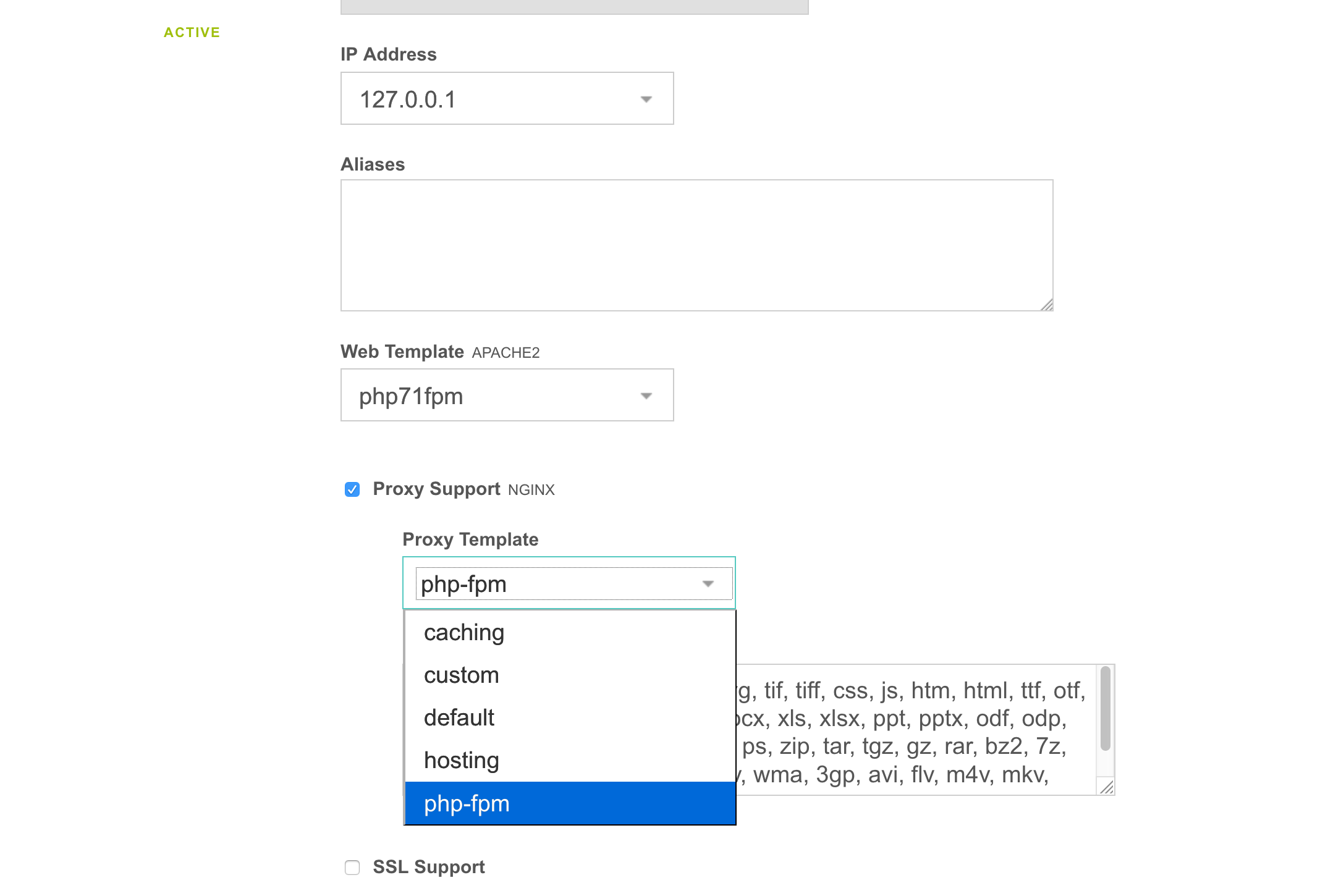There are two config to the php-fpm templates: fpm and nginx. On the nginx side, you have two options: php-fpm or custom
php-fpm template is optimize for majority of framework including concrete5, laravel, and/or wordpress. Outside of that, you have use the custom template. See some examples below.
custom template with ActiveCollab
- Choose
customas your nginx template and php7xfpm template for APACHE2. Don't worry, it's not really Apache2. It's is fpm config just re-using the same UI as APACHE2. - Add a file:
/home/{user}/web/{website.example.com}/private/custom.conf
index proxy.php;
access_log /var/log/apache2/domains/{website.example.com}.log combined;
access_log /var/log/apache2/domains/{website.example.com}.bytes bytes;
root "/home/{user}/web/{website.example.com}/public_html/public";
set $can_rewrite 0;
if (!-e $request_filename) {
set $can_rewrite 1;
}
if ($uri ~ ".well-known") {
set $can_rewrite 0;
}
if ($can_rewrite = 1) {
rewrite ^/assets/(.*)$ /assets/$1 last;
rewrite ^/avatars/(.*)$ /avatars/$1 last;
rewrite ^/wallpapers/(.*)$ /wallpapers/$1 last;
rewrite ^/verify-existence$ /verify.php last;
rewrite ^/proxy.php$ /proxy.php last;
rewrite ^/api/v([0-9]*)/(.*)$ /api.php?path_info=$2&api_version=$1 last;
rewrite ^$ /router.php last;
rewrite ^(.*) /router.php?path_info=$1 last;
}
location / {
rewrite ^/verify-existence$ /verify.php last;
rewrite ^/proxy.php$ /proxy.php last;
rewrite ^/api/v([0-9]*)/(.*)$ /api.php?path_info=$2&api_version=$1 last;
rewrite ^/$ /router.php last;
try_files $uri $uri/ /router.php?path_info=$uri&$args;
}
location ~ \.php$ {
# force https-redirects if not http
if ($scheme = http) {
return 301 https://$server_name$request_uri;
}
fastcgi_pass unix:/var/run/vesta-php-fpm-{website.example.com}.sock;
include /etc/nginx/fastcgi_params;
# overriding default
fastcgi_param SCRIPT_FILENAME $document_root$fastcgi_script_name;
fastcgi_intercept_errors on;
}
error_page 403 /error/404.html;
error_page 404 /error/404.html;
error_page 500 502 503 504 /error/50x.html;
location /error/ {
alias /home/{user}/web/{website.example.com}/document_errors/;
}
include /etc/nginx/location_optmz_php.conf;
disable_symlinks if_not_owner from=/home/{user}/web/{website.example.com};
Remember to replace {user} and {website.example.com} with appropriate/valid value.
Note: custom template can be use with anything, not just for PHP.
custom template for Gogs (self-hosted git written in Golang) or any kind of service that you want to nginx proxy_pass such as service running with nodejs, dotnet, etc...
- Choose
customas your nginx template anddefaultfor APACHE2. - Add a file:
/home/{user}/web/{website.example.com}/private/custom.conf
location / {
# force https-redirects if not http
if ($scheme = http) {
return 301 https://$server_name$request_uri;
}
proxy_pass http://127.0.0.1:10080;
}
location /error/ {
alias /home/{user}/web/{website.example.com}/document_errors/;
}
location @fallback {
proxy_pass http://127.0.0.1:10080;
}
include /etc/nginx/location_optmz_php.conf;
This assume that you're running Gogs Web on port 10080 so we proxy that port. Your gogs app.ini may look like so:
$ cat app.ini
APP_NAME = Your Git Service
RUN_USER = {user}
RUN_MODE = prod
[database]
DB_TYPE = sqlite3
HOST = none
NAME = none
USER = none
PASSWD =
SSL_MODE = disable
PATH = /home/{user}/gogs/data/gogs.db
[repository]
ROOT = /home/{user}/gogs-repos
[server]
DOMAIN = git.example.com
HTTP_PORT = 10080
ROOT_URL = https://git.example.com/
DISABLE_SSH = false
START_SSH_SERVER = true
SSH_DOMAIN = %(DOMAIN)s
SSH_LISTEN_HOST = 0.0.0.0
SSH_PORT = 22
SSH_LISTEN_PORT = 10022
OFFLINE_MODE = false
CERT_FILE = custom/https/cert.pem
KEY_FILE = custom/https/key.pem
ENABLE_GZIP = true
LANDING_PAGE = home
[mailer]
ENABLED = true
HELO_HOSTNAME = git.example.com
HOST = smtp.gmail.com:587
USER = [email protected]
PASSWD = your-email-password
[service]
REGISTER_EMAIL_CONFIRM = false
ENABLE_NOTIFY_MAIL = true
DISABLE_REGISTRATION = false
ENABLE_CAPTCHA = true
REQUIRE_SIGNIN_VIEW = true
[picture]
DISABLE_GRAVATAR = false
ENABLE_FEDERATED_AVATAR = false
[session]
PROVIDER = file
[log]
MODE = file
LEVEL = Info
ROOT_PATH = /home/{user}/gogs/log
[security]
INSTALL_LOCK = true
SECRET_KEY = 32AdfjlkksjdfA
phpfcgi7x with default nginx template - use this if you need to work with .htaccess file. Let say you unzip Laravel into the /home/{user}/web/{website.example.com}/lara-app folder, then you want to create a symbolic link to public_html folder like so:
ln -s lara-app/public public_html
